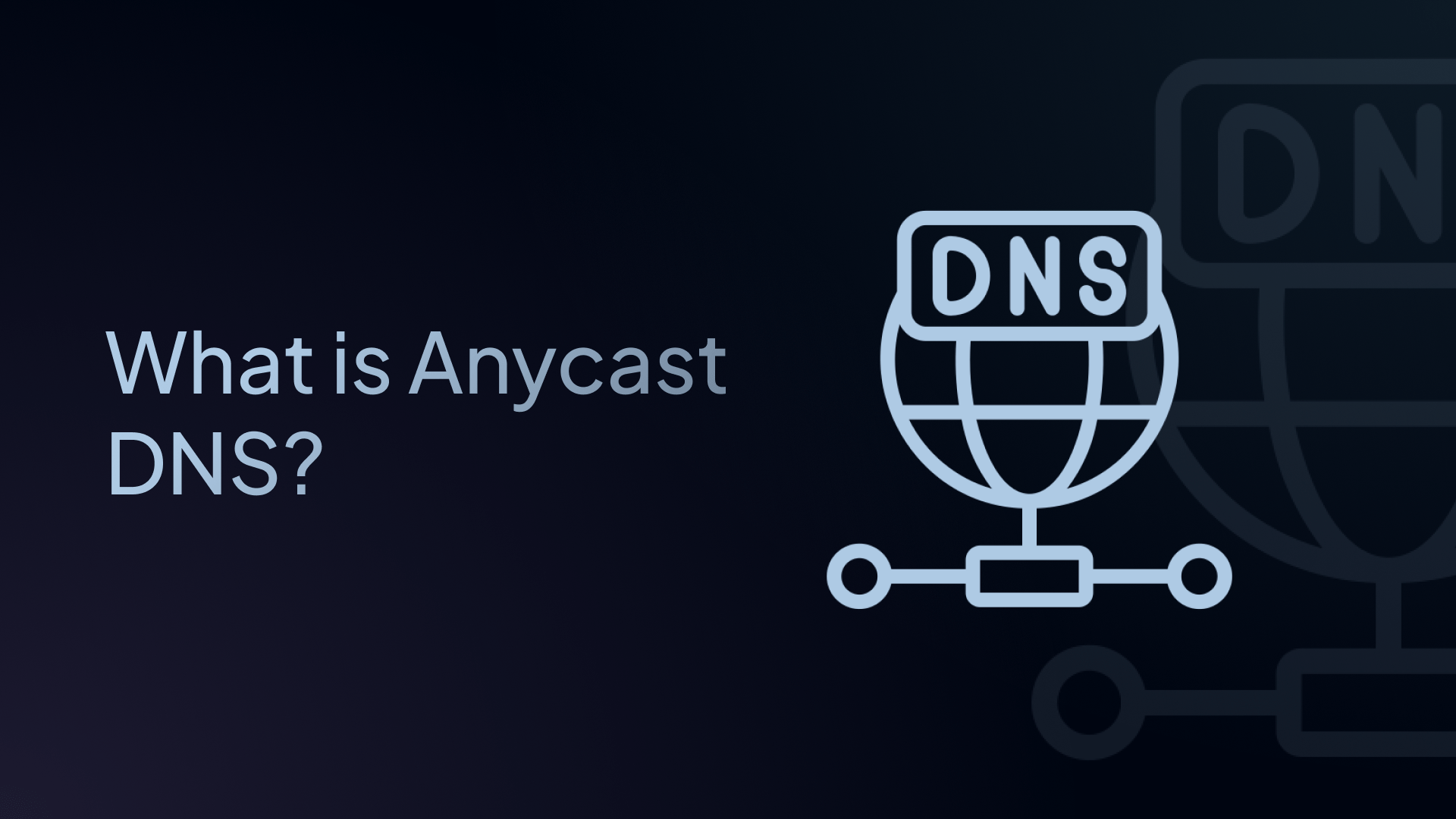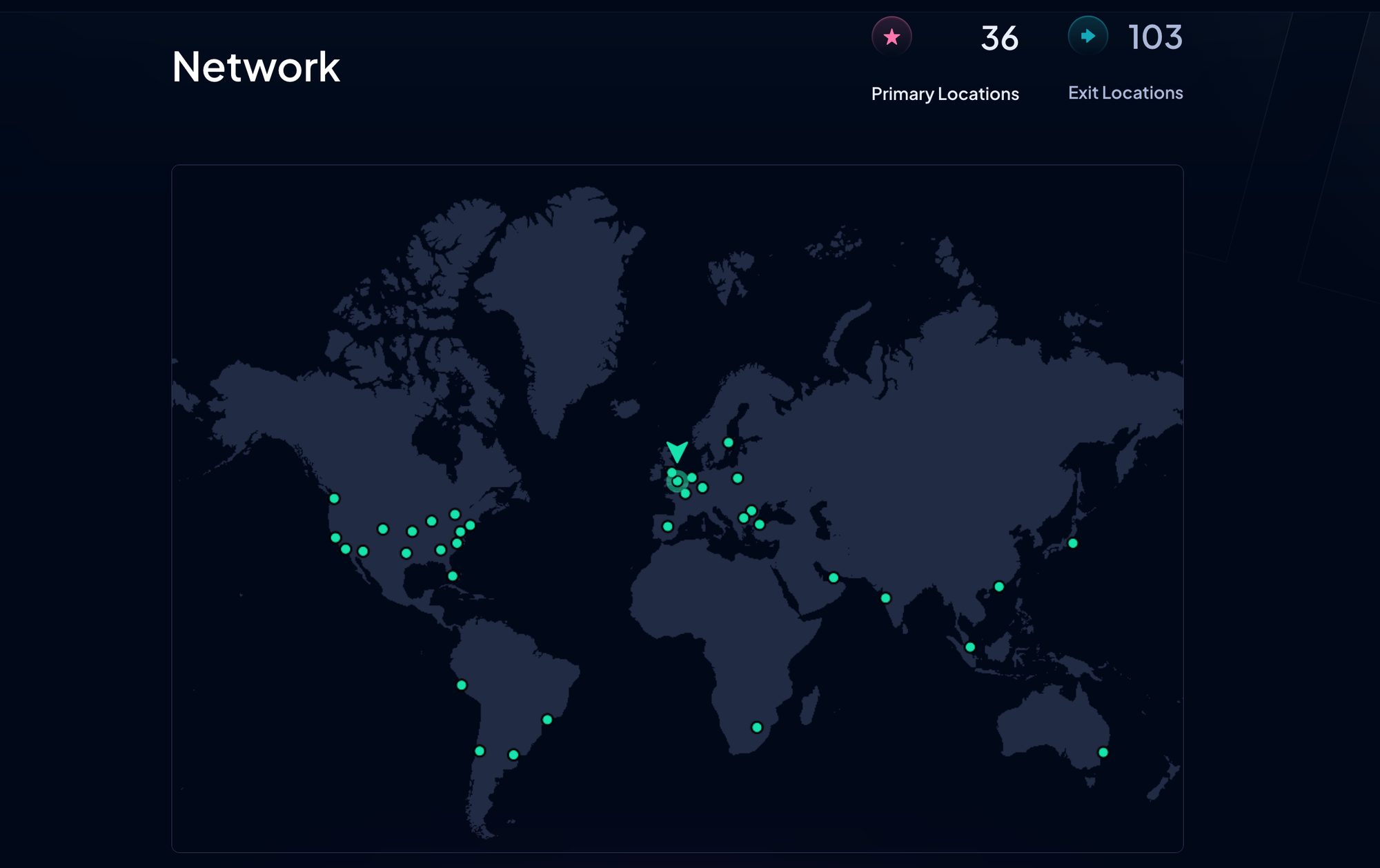What is Anycast DNS?
Find out why Anycast DNS is faster, more reliable, and more secure than traditional DNS, and how it benefits global businesses of all sizes.

Have you ever noticed how some websites load instantly while others take forever?
The secret is often Anycast Domain Name System (DNS), a smart technology that makes websites faster, more reliable, and harder to attack.
But what is it, how does it work, and what are the benefits for organizations and users? That's exactly what we'll break down in this article, and much more.
What is Anycast DNS?
Anycast DNS is a smart routing technology that automatically connects users to the closest and fastest DNS server from a global network. Instead of sending all DNS requests to one server (like traditional DNS), an Anycast network uses multiple servers worldwide that share the same IP address.
The key difference:
- Traditional (Unicast) DNS: Sends all requests to a single, fixed server - even if it's on another continent
- Anycast DNS: Sends each request to the nearest available server for faster, more reliable responses
Think of traditional DNS like having one customer service center in New York that handles calls from everywhere. Anycast DNS is like having identical customer service centers in New York, London, Tokyo, and 20 other cities - all with the same phone number. When you call, you automatically reach the closest one.
How does Anycast DNS work?
Here's a simple breakdown of how Anycast DNS operates:
🧩 Step 1: Multiple Servers, One IP Address
DNS providers set up servers in data centers around the world – New York, London, Singapore, Sydney, and dozens of other locations. All these servers use the same IP address but serve different geographic regions.
🧩 Step 2: Smart Routing Kicks In
When an employee tries to visit a website, their computer sends a DNS request. Internet routing protocols (specifically BGP – Border Gateway Protocol) automatically direct this request to the nearest or best-performing server.
🧩 Step 3: Lightning-Fast Response
The chosen server processes the request and sends back the IP address for the website you’re visiting.
🧩 Step 4: Automatic Failover
If the nearest DNS server is unavailable, DNS traffic is rerouted to the next closest or best-performing one without downtime. Users never notice the switch.
Top 5 Benefits of Anycast DNS
✅ 1. Faster Response Times
Speed directly impacts employee productivity. DNS queries travel a shorter distance, cutting latency from hundreds of milliseconds to as low as 20–30 ms. That means websites, applications, and cloud services all load faster.
✅ 2. Eliminates Single Points of Failure
Traditional DNS has a critical weakness: if the DNS server goes down, your entire organization loses internet access and security protection.
Anycast DNS eliminates this single point of failure – if the nearest server fails, traffic automatically routes to the next closest server
✅ 3. Superior DDoS Attack Protection
Cybercriminals often target DNS servers with Distributed Denial of Service (DDoS) attacks to take down websites and services. Anycast DNS makes these attacks much harder to execute because:
- Attack traffic gets spread across multiple servers instead of overwhelming one
- Geographic distribution makes it nearly impossible to target all servers at once
✅ 4. Easy Scaling
As your business grows and adds locations, employees, or remote workers, Anycast DNS scales automatically without requiring infrastructure changes – there’s no need to reconfigure DNS settings for new locations or worry about capacity planning.
✅ 5. Global Consistency
Whether your employees are in the main office, working from home, or traveling internationally, they get the same fast, reliable internet experience everywhere.
⚖️ Anycast DNS vs Traditional (Unicast) DNS
| Feature / Aspect | Anycast DNS | Unicast DNS |
|---|---|---|
| How It Works | Uses a single IP address shared across multiple DNS servers worldwide. Traffic is automatically routed to the closest or best-performing server, optimizing speed, efficiency, and reliability. |
Routes DNS queries to a single, designated server with a unique IP address. All queries go to thatsame server regardless of the user’s location. |
| Communication Type | One-to-nearest – queries are answered by the closest available server. |
One-to-one – queries are always handled by one specific server. |
| Advantages | - Very low latency globally. - High redundancy if one server fails, another takes over automatically. - DDoS resilience via traffic distribution. - Scales easily for growing organizations. |
- Simple to set up, implement, and manage. - Lower setup and maintenance costs. - Ideal for smaller networks or less complex systems. |
| Disadvantages | - More complex to deploy and monitor. - Higher initial cost than Unicast. |
- Single point of failure if the server goes down, all queries fail. - Higher latency for distant users. - Limited scalability; traffic spikes can overwhelm a single server. |
| Typical Latency | 15–50 ms globally (varies by provider and location). |
100–300 ms globally, higher for remote users. |
| Uptime Potential | Typically higher. | Typically lower. |
| Best For | Multi-location or global organizations, security-focused deployments, and services requiring high availability. |
Single-location networks, small businesses, and low-traffic environments. |
How DNS Filtering Benefits from Anycast DNS
When your organization uses DNS filtering to block malicious websites and protect against cyber threats, speed and reliability are crucial. Every DNS query needs to be checked against threat databases before allowing or blocking access.
While Anycast DNS doesn’t perform the filtering itself, its routing protocol ensures that a managed Anycast DNS service can complete this security check as quickly as possible by directing DNS traffic to the nearest or best-performing server, regardless of your employees' locations.
This means:
- Faster security checks for employees anywhere in the world
- Consistent protection whether they're in the office, traveling, or remote
- Zero disruption, even if one filtering server goes offline
- Lower latency means employees don't get frustrated and try to bypass security
How Control D Uses Anycast DNS

Control D is an enterprise-grade DNS management service with a global network of 100+ locations in over 60 countries, all with Anycast routing.
Here’s what that means for users:
✅ Low Latency Everywhere – DNS queries hit the nearest Control D filtering server in milliseconds.
✅ High Availability – Automatic failover between servers results in a higher uptime.
✅ DDoS Resilience – Attack traffic is absorbed and dispersed across our network.
✅ Consistent Filtering – Regardless of where you’re located, you get the same fast, secure experience.
Control D combines the speed and reliability of Anycast with advanced DNS filtering, so you don’t have to choose between performance and security.
Common Anycast DNS Use Cases
- Enterprise DNS Filtering – Organizations using DNS filtering see dramatic improvements in both security effectiveness and user experience when switching to Anycast.
- Multi-Location Businesses – Companies with offices in different countries achieve consistent, fast performance everywhere, eliminating the issue of some locations being slower than others.
- Remote Workforce Protection – With employees working from home or globally, Anycast ensures consistent security protection regardless of location.
- Compliance-Heavy Industries – Industries with strict uptime requirements (finance, healthcare, government, etc.) use Anycast to meet regulatory standards.
Challenges of Anycast DNS
While Anycast DNS offers numerous benefits, it's not without its challenges:
Higher Initial Costs
Anycast DNS typically costs 2-3x more than traditional DNS. However, the ROI usually justifies the investment through:
- Reduced downtime costs
- Improved employee productivity
- Better security outcomes
- Lower cybersecurity incident costs
Implementation Complexity
Implementing Anycast DNS requires more expertise than traditional DNS. Most organizations work with managed DNS providers (like Control D) to handle the technical complexity.
Monitoring Requirements
You'll need better tools to track performance across multiple servers and locations – though most Anycast providers include comprehensive monitoring dashboards.
Final Thoughts
Speed, reliability, and security are non-negotiable in today’s internet. Anycast DNS delivers all three by routing users to the closest server in milliseconds – and when paired with DNS filtering, it becomes a powerful defense against cyber threats and downtime.
Control D offers enterprise-grade Anycast DNS filtering with no setup fees and no long-term contracts – just faster, more secure internet for your entire organization.

Frequently Asked Questions (FAQs)
What's the difference between Anycast DNS and regular DNS?
Regular DNS (called Unicast) sends all requests to one specific server. Anycast DNS automatically routes requests to the best available server from a global network.
Is Anycast DNS expensive?
While setup costs are higher than unicast DNS, the improved performance and security often justify the investment for businesses serving global audiences.
How do I know if I need Anycast DNS?
Absolutely. Many providers offer affordable Anycast plans that deliver immediate performance improvements for businesses of any size.
Can small businesses benefit from Anycast DNS?
Yes! Many DNS providers now offer Anycast services at affordable prices, making it accessible to businesses of all sizes.
Will Anycast DNS work with my existing security tools?
Yes, Anycast DNS integrates seamlessly with existing firewalls, security appliances, and monitoring systems.

